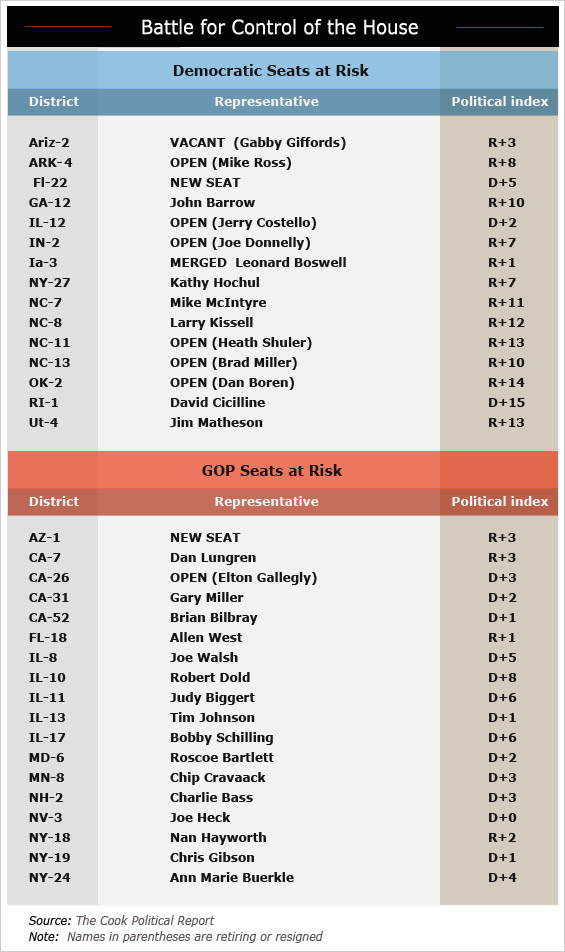Mike Ross, a Blue Dog Democrat from Arkansas, is bailing out of the House at the end of the year with an eye to a possible run for governor in two year. Brad Miller, a five-term conservative Democrat from North Carolina, is retiring because his once comfortably Democratic district was transformed into a solidly GOP district by the state legislature. And Dan Boren, Oklahoma's only Democratic House member and the son of a prominent former governor and senator, announced he wouldn’t seek a fifth term because he’s tired of campaigning and wants to spend more time with his family.
This could be a tough year for the Republicans as they fight to keep control of the House and topple the Democratic leadership in the Senate. Widespread voter disgust with congressional gridlock and President Obama’s improved standing in the polls could combine to undermine the GOP’s increasingly tenuous hold on the House. But if the Republicans succeed in preserving their majority in the House this November, as House Speaker John Boehner and GOP political strategists insist they will, it will be due in part to the mass exodus of veteran Democratic House members who decided to retire, resign or seek higher office. In all, at least 21 House Democrats are retiring at the end of the year, leaving in their wake at least six congressional seats ripe for Republican pickups. Those include one apiece in Arkansas, Illinois, Indiana and Oklahoma and two in North Carolina.
By contrast, only 17 Republican House members plan to hang it up this year, and just one of those seats, held by outgoing Rep. Elton Gallegly of California, is considered vulnerable to a Democratic challenge. For sure, the Democrats have plenty of other opportunities to knock off wobbly GOP incumbents in a year in which the two parties are drawing sharp contrasts in their stands on Medicare, health care reform, taxes and the deficit, and some analysts say they could pick up as many as 15 seats in the general election.

But short of a massive repudiation of the Republicans and a tidal wave of support for President Obama this fall, the Democrats will be hard pressed to pick up anywhere near the 25 seats they would need to reclaim control of the House. “Democrats have more takeover opportunities because they lost a lot of seats in 2010, so they will bounce back somewhat,” said David Wasserman, a House expert for the Cook Political Report. “But after the first five to 15 opportunities, the next set of Republican House seats gets much, much harder.”
University of Virginia political scientist Larry Sabato says that the Democrats may not even do that well unless the political stars are well aligned and Obama makes a strong showing across the country. Sabato’s latest Crystall Ball forecast released early today shows the Democrats picking up only two to three seats.
“Our basic conclusion is that Democrats can win the House only if Obama wins a second term with a margin approaching his 2008 victory,” Sabato told The Fiscal Times Wednesday. “That seems unlikely, given the state of the economy. . . . If Obama wins a more narrow victory, say 51 percent of the two-party vote, the GOP is very likely to hold the House. . . .Should Obama lose reelection, the Republicans are certain to hold the House.”
The outcome of the House races this fall will be dictated to a large degree by the decennial redistricting that is nearly over. While there are hotspots all over the country, the Crystall Ball analysis shows, the key region that will determine future control of the House is a combination of the Midwest and the Northeast -- the eight states that touch the Great Lakes: Indiana, Illinois, Michigan, Minnesota, New York, Ohio, Pennsylvania, and Wisconsin.
Of these eight, Republicans controlled the redrawing of House maps in five of them -- Indiana, Michigan, Ohio, Pennsylvania and Wisconsin. The courts drew the maps in New York and Minnesota, and Democrats controlled redistricting in Illinois. In other words, if the race for the House truly comes down to the Great Lakes states, Democrats will have to break some Republican-drawn maps – a very difficult task at best.
This highly partisan and creative redistricting by Republicans as well as some Democratic-controlled state legislatures weakened or eviscerated many Democratic congressional districts and forced incumbents to either retire, slug it out with another Democrat thrown into their districts, or face annihilation at the polls in November.
Ross, the Arkansas conservative Democrat who played an important role in negotiations over health care reform, and two fellow Blue Dog Democrats, Heath Shuler and Brad Miller of North Carolina, decided to retire after their districts were adversely redrawn. Democrat Jerry Costello, said he had grown tired of the commute between Illinois and Washington and decided against seeking a 13th term. House member Joe Donnelly of Indiana decided to run for the Senate and Boren said he wanted to take some time off before deciding whether to run for governor.
All six of those Democratic seats are in play, with the Republicans confident of winning most of them. “We see five seats they have just given us with retirements across the country,” said a congressional Republican strategist who closely follows House races. “At the end of the day, a lot of money is going to be spent for probably only like a five to ten seat switch, but I don’t think anyone is really talking about anything dramatic happening in the House this year.”
Overall, there are currently 23 Democratic seats the Cook Political Report lists as “tossups” or leaning Democratic and 32 Republican seats considered too close to call or leaning GOP.

House Speaker John Boehner boasted in an interview with POLITICO earlier this year that the GOP’s hold on the House was ironclad for the coming decade, and that “I think it will be nearly impossible” for the Democrats to win back the House in November. But that was before the congressional Republicans’ approval rating hit about rock bottom, the jobless rate and economy began to improve, and Obama’s popularity topped 50 percent for the first time in over a year.
Gridlock and a near default on U.S. debt because of partisan bickering over new debt ceiling legislation have hurt the Republicans’ standing with the public. More than 70 percent of Americans disapprove of the performance by congressional Republicans, according to a recent Washington Post-ABC News poll.
And the latest House GOP budget plan drafted by Rep. Paul Ryan that would gradually change the current Medicare and Medicaid system is certain to enrage many seniors and liberal advocates for the poor. At the same time, Boehner, Majority Leader Eric Cantor of Virginia and other House GOP leaders are under pressure from rank and file to press for passage of a package of corporate and individual tax measures, regulatory relief and increased energy production to highlight their differences with Obama and shed their “do nothing” reputations. Democrats are calling these measures little more than sops to the rich and the Republicans’ corporate allies.
House Democratic leaders including Minority Leader Nancy Pelosi of California and Democratic Congressional Campaign Committee Chairman Steve Israel of New York insist that control of the House is in play – although Democratic leaders generally stop well short of predicting outright victory in November.
Former Rep. David Obey, D-Wis., said yesterday that the Democrats might pull off a victory this fall “because I think the public is very uptight about what the Congress has been doing; they feel uptight about their own situation . . . and I think Mitt Romney is going to be the weakest Republican presidential candidate since Barry Goldwater.”
Former Republican Rep. Tom Davis of Virginia wrote earlier this year in Roll Call that the Democrats would need an electoral wave to take 25 seats, but it’s possible. “No presidential reelection in recent memory has yielded a 25-seat gain for the president’s party, with the exception of 1964, which was not technically a reelection,” Davis said. “Continued polarization and obstruction could create such a wave.”
“The bottom line is that there is an intense buyer’s remorse that has set in with voters over the Republican agenda and it’s capped off with the Republican plan on Medicare,” said Jesse Ferguson, national press secretary for the Democratic Congressional Campaign Committee. “That has driven dramatic movement where voters now want Democrats in control of Congress in 2012.”





